It’s a popular misconception that veganism is a diet. It’s not. Veganism is a lifestyle which seeks to exclude, as far as is possible and practical, all forms of exploitation of, and cruelty to animals for food, clothing or any other purpose. That may seem extreme for most – not everyone is willing to cut pizza and leather jackets from their lifestyles. November marks World Vegan Month and The Daily Vox put together five reasons to consume less animal products.
1. It can be cheaper
Eating plant-based food doesn’t have to be about acai smoothie bowls and matcha almond lattes despite what it may seem like on Instagram. Replacing some of your meat and dairy products with plant-based foods can be much easier on the wallet. A Journal of Hunger & Environmental Nutrition study published in 2015 showed that vegetarians could save at least $750 (about R10 610) more than meat-eaters per year.
2. It can be better for your health
Modern farming practices use antibiotics as preventative health measures for their livestock. The overuse of these antibiotics in livestock leads to antibiotic resistant strains, known as “superbugs,” placing humans at greater risk of disease and epidemics. Food-borne illnesses, bacteria, parasites, and chemical toxins are also more common in commercial meat, poultry, and seafood compared with plant-based foods.
Eating less animal products – particularly meat and dairy – and replacing these with healthier alternatives could reduce your risk of cardiovascular disease, stroke, and even cancer. This will allow you to lead a healthier — and lengthier — life. This can be attributed to a higher intake of fibre and disease-preventing antioxidants.
3. You could help save the Amazon – and the environment in general
Cattle farming is a huge contributor to greenhouse gases. Cattle produce and emit large quantities of methane, a greenhouse gas 23 times more potent by quantity than carbon dioxide. The livestock industry is considered responsible for 18% of all manmade greenhouse gas emissions more than all of the world’s non-livestock-related transportation, including all cars, planes, and ships.
Livestock also produce masses of fecal waste. In its solid form it can be used as manure, however, when mixed with water, it forms a “slurry.” The slurry is typically left in large open-air lakes called “slurry pits,” or spread onto fields as fertiliser. Problems arise when bacteria and other contaminants from this waste streams into and pollutes water supplies.
Livestock farming also requires a great deal of land for the animals themselves and to grow the large quantities of food required to feed them. The high demand for animal products contributes to mass deforestation. The Amazon rainforest has particularly suffered deforestation to make way for land for cattle ranching and soybean farming. Although soybeans are considered part of meat-free diets, 83% of the global soybean production is used for animal feed, a less food-efficient use than its direct consumption.
4. You could help reduce world hunger
The demand for meat in high-income countries likely contributes to hunger and malnutrition in low-income countries. Thirty-five percent of all grains produced in the world go to feeding livestock in the USA, livestock consumes more than seven times the amount of grains as the entire human population. Feeding grain to livestock is not food efficient. According to a recent National Geographic report on the global food system: “For every 100 calories of grain we feed animals, we get only about 40 new calories of milk, 22 calories of eggs, 12 of chicken, 10 of pork, or 3 of beef.” Our food preferences have led us to a mass food wastage. A general decrease in animal product consumption in developed countries would likely mean a more efficient world food system.
What about fish, you ask? The current levels of seafood consumption in the developed world further contribute to food scarcity. Studies have shown the present rates of fishery depletion to be unsustainable, leading to significant collapses in global fish populations. Consuming less seafood allows fish populations a better chance of future recovery, therefore improving our ability to feed the world.
5. You’ll help reduce animal cruelty
Despite what we may be led to believe, the animals we consume aren’t frolicking in green pastures in the country. They live in industrial sheds and are subjected to factory farming that abuses animals for the sake of production, efficiency and profit. The farms are often dirty, dusty, unhygienic, and crowded. Conditions are terrible for egg-laying hens, chickens raised for meat, dairy cows and domestic pigs. For example, in the pork industry pigs are kept in cages barely bigger than their own bodies where they can’t even turn around. Thousands of pigs are kept in these crates their entire lives.









